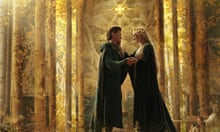A Soviet television adaptation of The Lord of the Rings thought to have been lost to time was rediscovered and posted on YouTube last week, delighting Russian-language fans of JRR Tolkien.
The 1991 made-for-TV film, Khraniteli, based on Tolkien’s The Fellowship of the Ring, is the only adaptation of his Lord of the Rings trilogy believed to have been made in the Soviet Union.
Aired 10 years before the release of the first instalment of Peter Jackson’s movie trilogy, the low-budget film appears ripped from another age: the costumes and sets are rudimentary, the special effects are ludicrous, and many of the scenes look more like a theatre production than a feature-length film.
The score, composed by Andrei Romanov of the rock band Akvarium, also lends a distinctly Soviet ambience to the production, which was reportedly aired just once on television before disappearing into the archives of Leningrad Television.
Few knew about its existence until Leningrad Television’s successor, 5TV, abruptly posted the film to YouTube last week [part one | part two], where it has gained more than 800,000 views within several days.
“Fans have been searching the archives but had not able to find this film for decades,” wrote World of Fantasy, a Russian-language publication that has written about adaptations of Tolkien’s work.
“There should be a statue to the person who found and digitised this,” one commenter posted.
Earlier adaptations and even translations of Tolkien’s work in the Soviet Union were hard to come by, with some convinced that the story of an alliance of men, elves and dwarves fighting a totalitarian eastern power had been blocked by the censor.
But another suggestion for the sparsity of translations was that Tolkien’s intricate plot and linguistic invention made it difficult to translate into Russian without either adulterating the original or leaving Soviet audiences without any idea of what was happening.
Nonetheless, the schlocky adaptation appeared to scratch a nostalgic itch for many who watched it.
“It is as absurd and monstrous as it is divine and magnificent. The opening song is especially lovely. Thanks to the one who found this rarity,” wrote another. In the opening song, Romanov sings a rough translation of Tolkien’s description of the origins of the rings of power, of which three are given to the elves, seven to the dwarves, and nine to mortal men, doomed to die.
The Soviet version includes some plot elements left out of Jackson’s $93m blockbuster, including an appearance by the character Tom Bombadil, a forest dweller cut from the English-language version because he was too long-winded and failed to move the plot forward.
The first Soviet samizdat translation of The Fellowship of the Ring was produced in 1966, more than a decade after Tolkien’s book of that name was published. And the first published translation came out in the Soviet Union in 1982, although its sequels, The Two Towers and The Return of the King, were not released until years later.
In 1985, Leningrad Television aired its first version of Tolkien’s work, a low-budget adaptation of The Hobbit featuring ballet dancers from what is now the Mariinsky theatre and a moustachioed narrator standing in for Tolkien. The abridged production, titled The Fantastic Journey of Mister Bilbo Baggins, the Hobbit, skips over the trolls and elves in an hour-long romp that was long believed to be the only finished Tolkien adaptation produced during the Soviet Union.
According to World of Fantasy, a 1991 animated version of The Hobbit called The Treasure Under the Mountain was scrapped, leaving only six minutes of footage that is available online.
Jackson’s adaptation of the trilogy was a hit in Russia. Many young Russians watched a version dubbed by the translator Dmitry Puchkov under the pseudonym Goblin, which was notable for its expletive-laden reinterpretation of the text. In that version, Frodo is called Fyodor Mikhailovich, Legolas has a pronounced Baltic accent, and Aragorn yells “Whoever doesn’t hit [an orc] is an ass,” as his archers let their arrows fly during the defence of Helm’s Deep.









